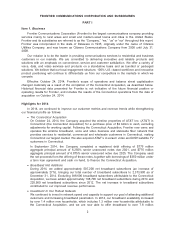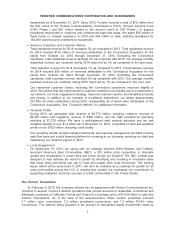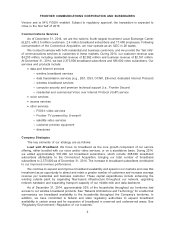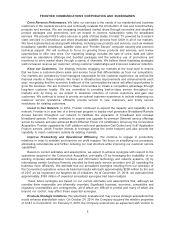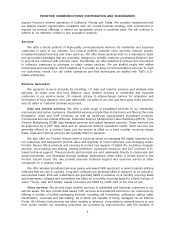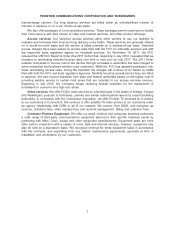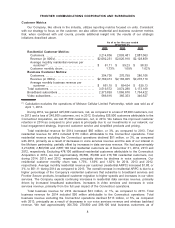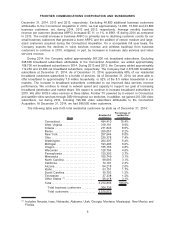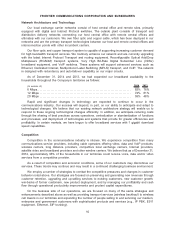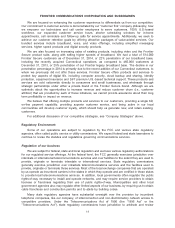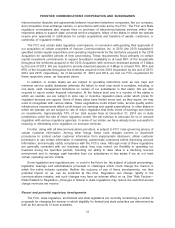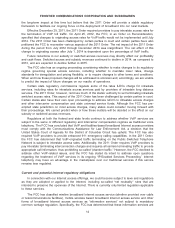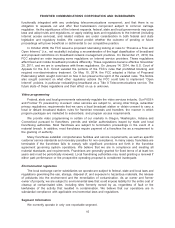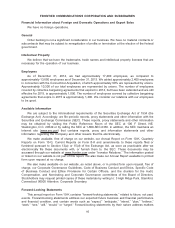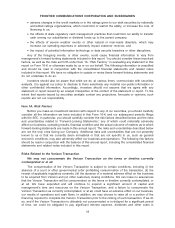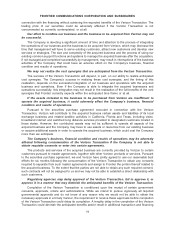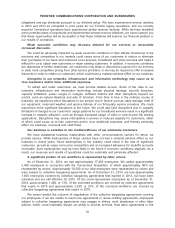Frontier Communications 2014 Annual Report Download - page 13
Download and view the complete annual report
Please find page 13 of the 2014 Frontier Communications annual report below. You can navigate through the pages in the report by either clicking on the pages listed below, or by using the keyword search tool below to find specific information within the annual report.interconnection disputes and agreements between incumbent telephone companies, like our company,
and competitive local exchange carriers, in accordance with rules set by the FCC. The FCC and State
regulatory commissions also impose fees on providers of telecommunications services within their
respective states to support state universal service programs. Many of the states in which we operate
require prior approvals or notifications for certain acquisitions and transfers of assets, customers, or
ownership of regulated entities.
The FCC and certain state regulatory commissions, in connection with granting their approvals of
our acquisition of certain properties of Verizon Communications Inc. in 2010 (the 2010 Acquisition),
specified certain capital expenditure and operating requirements for the territories acquired in the 2010
Acquisition for specified periods of time post-closing. These requirements focus primarily on certain
capital investment commitments to expand broadband availability to at least 85% of the households
throughout the territories acquired in the 2010 Acquisition with minimum download speeds of 3 Mbps
by the end of 2013. We are required to provide download speeds of 4 Mbps to at least 75%, 80% and
85% of the households throughout the territories acquired in the 2010 Acquisition by the end of 2013,
2014 and 2015, respectively. As of December 31, 2013 and 2014, we met our FCC requirement for
these respective years, as discussed above.
In addition, in certain states we are subject to operating restrictions such as rate caps and
minimum service quality standards (whereby the failure to meet may result in penalties, including, in
one state, cash management limitations on certain of our subsidiaries in that state). We are also
required to report certain financial information. At the federal level and in a number of the states in
which we operate, we are subject to price cap or incentive regulation plans under which prices for
regulated services are capped. Some of these plans have limited terms and, as they expire, we may
need to renegotiate with various states. These negotiations could impact rates, service quality and/or
infrastructure requirements which could impact our earnings and capital expenditures. In other states in
which we operate, we are subject to rate of return regulation that limits levels of earnings and returns
on investments. Approximately 15% of our total access lines at December 31, 2014 are in state
jurisdictions under the rate of return regulatory model. We will continue to advocate for no or reduced
regulation with various regulatory agencies. In some of our states, we have already been successful in
reducing or eliminating price regulation on end-user services.
Frontier, along with all telecommunications providers, is subject to FCC rules governing privacy of
certain customer information. Among other things, these rules obligate carriers to implement
procedures to: protect certain customer information from inappropriate disclosure; obtain customer
permission to use certain information in marketing; authenticate customers before disclosing account
information; and annually certify compliance with the FCC’s rules. Although most of these regulations
are generally consistent with our business plans, they may restrict our flexibility in operating our
business during the specified periods, including our ability to raise rates in a declining revenue
environment and to manage cash transfers from our subsidiaries in two states if we do not meet
certain operating service criteria.
Some legislation and regulations are, or could in the future be, the subject of judicial proceedings,
legislative hearings and administrative proposals or challenges which could change the manner in
which the entire industry operates. Neither the outcome of any of these developments, nor their
potential impact on us, can be predicted at this time. Regulation can change rapidly in the
communications industry, and such changes may have an adverse effect on us. See “Risk Factors—
Risks Related to Regulation—Changes in federal or state regulations may reduce the switched access
charge revenues we receive.”
Recent and potential regulatory developments
The FCC, state regulators, and federal and state legislators are currently considering a number of
proposals for changing the manner in which eligibility for federal and state subsidies are determined as
well as the amounts of such subsidies.
12
FRONTIER COMMUNICATIONS CORPORATION AND SUBSIDIARIES


